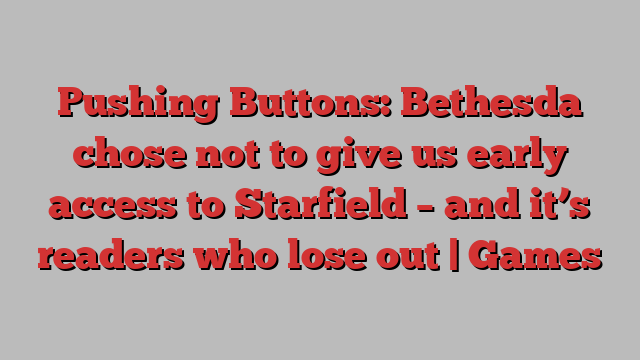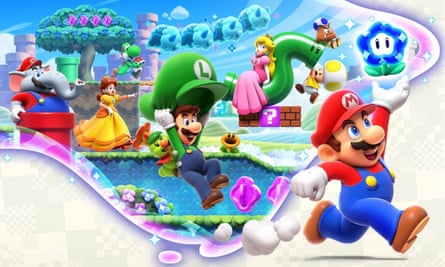
The Guardian’s review of space exploration epic Starfield, Xbox’s big game of the year, went live this morning – almost a week after other outlets published theirs. This is because Bethesda did not give our reviewer an advance copy, as publishers usually do. Along with several others, including the greatly respected games publications Eurogamer and Edge, we were left waiting until the game’s early access release last Friday to play it.
Bethesda’s reasons for cherry-picking reviewers are known only to itself, but it’s far from the only publisher to do this. Sometimes, controlling early reviews is a way to manipulate a game’s Metacritic average in the crucial first week of release. This happened earlier in the year with Hogwarts Legacy, when Warner Bros distributed copies to certain outlets long before others; the result was an initial flurry of very positive reviews, with more measured takes appearing around or after the game’s release, once critics had played for longer. When reviewers receive review codes close to a game’s embargo or release date, they are often under pressure to rush, and that can skew their experience.
Other times, publishers withhold access from the press because they simply don’t like what a media outlet has said or done in the past when it comes to their products. Sometimes it’s over a bad review (I knew of one publisher that blacklisted a publication over an unflattering preview). Other times it’s because of an outlet’s reporting; before I worked at the Guardian I was UK editor at Kotaku, and Ubisoft blacklisted us for ages because we kept reporting behind-the-scenes details about their games. (Bethesda also had us blacklisted, over reporting on the yet-to-be-announced Fallout 4.)
Negotiating all this is part of the job for games journalists. Publishers aren’t obligated to provide early access to games; I certainly don’t feel entitled to it, and I’m perfectly able to do my job without, if it comes to that. It is professionally frustrating not to be able to get a review up at the same time as other outlets, but that’s the extent of it. However, all this finagling is bad news for those who buy games. Being able to read reviews and opinions in the run-up to a game’s release is important if you’re considering whether or not to spend £70 on it. If, in the future, the only people covering games at release time are paid-off influencers, professional fans and reviewers who publishers have decided will give positive coverage, making an informed decision about what to purchase becomes much harder. Blockbuster isn’t here to rent you a hot new release before purchase any more.
Starfield has had a mixed but broadly positive reception so far. It got 7/10s from IGN and GameSpot, the big US games websites, alongside full marks from a host of others. Our reviewer gave it four stars. I’ve played it for a few hours myself and I’m bouncing off it. It is very much like No Man’s Skyrim, as much about menus and mining and navigation as it is about finding interesting questlines and exploring planets on a whim. It’s difficult to feel like a spontaneous adventurer when getting to and landing on a planet involves paging through several different screens and waiting for things to load.

Compared to Mass Effect – which is much smaller in scope but packed with character – Bethesda’s version of space feels oddly sterile. What I’ve encountered so far is mostly humans and rocks, with the occasional gunfight against alien insects or space pirate gangs.
I am reliably informed that this is one of those games that might get its hooks into you after the first 10 or even 20 hours, and if it’s like Bethesda’s other games, the world and your character’s skills will mould more and more to your own play style over time, showering you with positive reinforcement. This developer’s adventures have never been strictly authored. The stories come from the interplay between player, world and systems: that cavern full of vampires you once found, or being chased across the desert by a bunch of radioactive scorpions.
Starfield’s ambition is to create this same player-centric open-ended adventure, but in space, expanding its playground across the known universe. The question is whether that’s possible without watering down the experience. This is where critics are divided. Simon Parkin, who wrote our review, feels that it works out in the end, but only if you commit the hours: “Starfield, as with Bethesda’s previous work, requires its player to submit to the spell that is being cast. The rewards for those who can overlook the oftentimes awkward delivery of dialogue, bodies that clip through the scenery, the confusion of menus and the flimsy feel of combat are considerable.”
For a long time, putting up with technical flimsiness was part of gaming. Designers strained constantly against technological limitations, and gamers were ready to forgive the resulting glitchiness. Making games is almost impossible, after all, and even the least ambitious finished games are minor miracles. I think Bethesda games will always retain a little bit of that rough-and-ready feel, no matter how advanced and polished they become; it’s part of their charm. For my taste, though, the forthcoming fantasy Elder Scrolls 6 might be a more worthwhile investment of time.
What to play

Art about teenage drama can be a slog to sit through as an adult, largely because so many of the problems we have as teenagers start to look so massively inconsequential in the rear-view mirror . That’s not an issue in the case of the dinosaur kids in Goodbye Volcano High. Their problem is an asteroid that’s about to wipe them out, along with everyone else on the planet. They’re having one last year, and they’re determined to make the most of it – but they’re teenagers, so they struggle to be straightforward with their feelings.
The game has some clever ways of communicating this, and of showing how main character Fang’s relationships with their friend group develop. For instance, if you want to get Fang to say something they find difficult, you have to contort your hands to press a bunch of buttons at once. All that matters to Fang is their band, but the other members are somewhat less invested; the rhythm-action-style band practice sequences are a highlight. If you can get over the earnest delivery and invest in the characters, this is a bravely sincere addition to a growing canon of coming-of-age games.
Available on: PC, PlayStation 4/5
Estimated playtime: 6 hours
What to read

-
At Gamescom I interview Super Mario Bros Wonder’s producer Shiro Mouri and one of the designers of the original Super Mario Bros, Tezuka Takashi, who once sketched out levels on graph paper and still works on the series. We talked about recapturing Mario’s sense of the unexpected and what a 2D Mario game means in 2023.
-
There’s been some weirdness around the departure of Charles Martinet as the voice of Mario, which was announced last month (and pre-empted by fans who noticed that Mario sounded different in the forthcoming Wonder). Nintendo has said that Charles will remain a Mario ambassador, but evidently the man himself isn’t quite sure what that means. Nintendo also hasn’t announced who has replaced him.
-
Netflix has been doing the rounds talking up its expansion into gaming, which continues apace. According to the developers interviewed in this BBC piece, they are a better publishing partner than Amazon or Google have been in the past. Will Netflix in fact become the Netflix of games?
-
I think I’ve talked before about the Animal Crossing fan who embarked on a journey around the world to see all 43 of the famous artworks featured in the game in real life. Well, after more a year, he has completed his quest.
-
British developer The Chinese Room, famed for Everybody’s Gone to the Rapture, has taken over development on Vampire: The Masquerade Bloodlines 2, a much-delayed game that has already been through one studio and several creative leads after a string of controversies. Best of luck folks, and here’s hoping they can get it over the line.
after newsletter promotion
What to click
Question Block

An answer in place of a question this week. Reader Leigh wrote in a few weeks ago asking for video game music podcast recommendations and I opened it out to the readership. So here are your recommendations, not just for game music podcasts, but video game podcasts in general.
“I would recommend Into the Aether and The Besties as two good (but very different) video game podcasts. Into the Aether will do a five-hour deep-dive on the Sega Dreamcast, while The Besties tries to keep up with newer games.” – Maria
“Pixelated Audio is worth a listen. It’s a long-running game music podcast that mostly deals with retro games but also covers indies as well. I also enjoy Play, Watch, Listen, hosted by Alanah Pearce and featuring Austin Wintory, Mike Bethell and Troy Baker. It’s often fascinating and insightful.” – Adam
“Topic Lords is presented by Jim Stormdancer (Frog Fractions creator, programmer, producer). In each episode Jim invites two other presenters to discuss topics of their choice. The other presenters are often but not always working in the game industry. If you ever listened to Idle Thumbs, or the short-lived Important If True (both of which ended when Valve bought Campo Santo), then you’ll love Topic Lords!” – Rich
“BattleBards, a fantastic podcast on MMO soundtracks, is the best I’ve found that caters to this niche of game music fandom.” – Tom
“I highly recommend The Untitled Games Project, in which Cal Doughty interviews guests to help create their perfect game.” – Anonymous
“I don’t hesitate to recommend Sound of Gaming. It’s a Radio 3 programme, but the BBC put it out as a podcast, which is how I listen. Presented by Louise Blain, it has themed episodes featuring an interview every episode with a composer. Really terrific.” – Kenny
I’m in need for more queries for Question Block – so if you’ve got one, or anything else to say about the newsletter – hit reply or email me on [email protected].